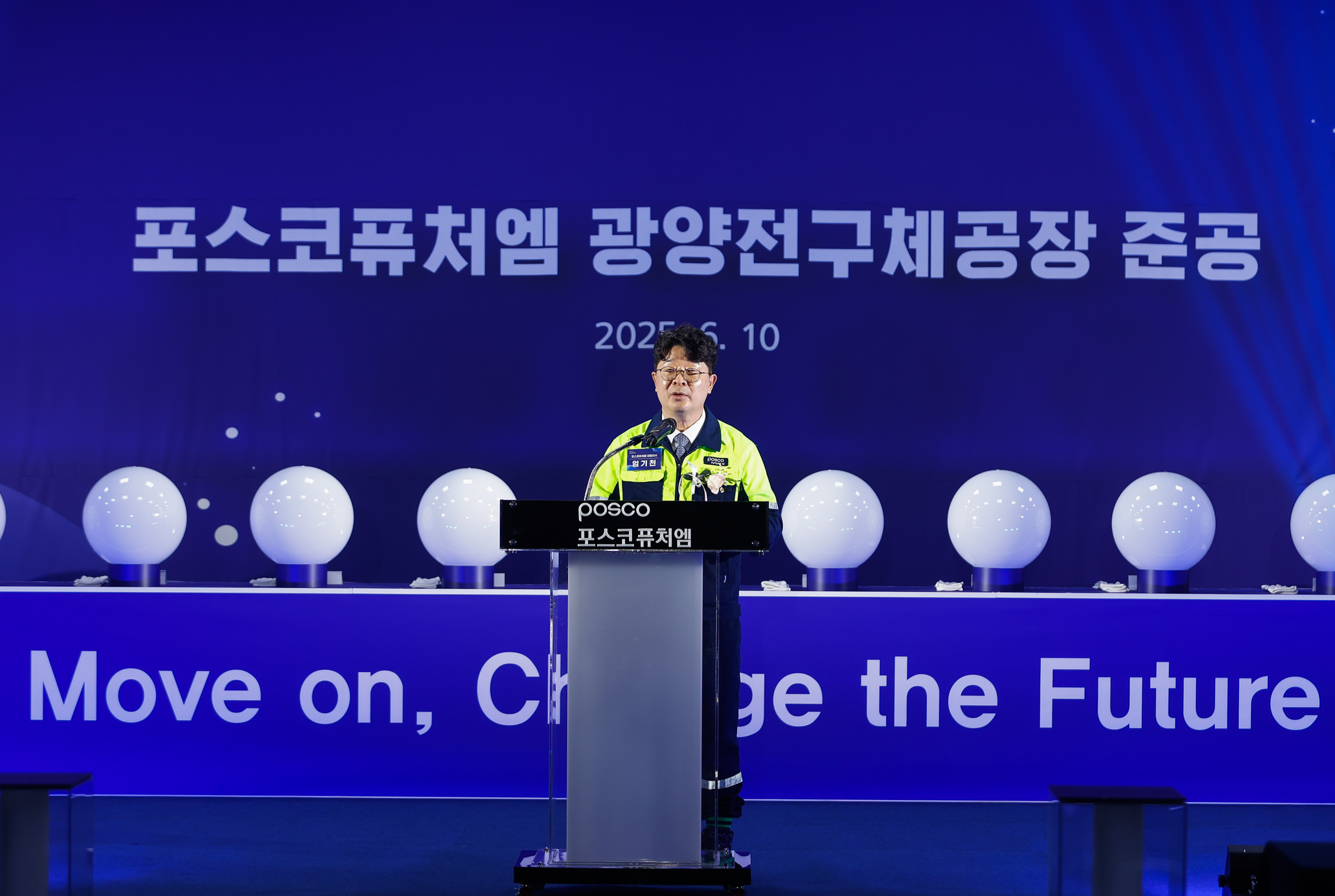Completed precursor plant with annual capacity of 45,000 tons in Gwangyang, Jeollanam-do Province on the 10th
Achieved a self-sufficient system spanning ‘raw materials, semi-finished products, and cathode materials’ amid global policy changes
Secured POSCO Group’s supply chain for high-purity nickel sulfate, a key precursor raw material, following lithium
POSCO Future M has completed its Gwangyang precursor plant with an annual production capacity of 45,000 tons.
Through this achievement, the company has secured the in-house capability to produce precursors, a key raw materials for cathode materials, thereby strengthening its supply chain competitiveness.
POSCO Future M held the completion ceremony for its precursor plant at the Yulchon Industrial Complex in Gwangyang, Jeollanam-do Province, on the 10th.
The event was attended by approximately 70 officials, including POSCO Future M President Gi-chen Eom, POSCO Holdings Business Synergy Division Head Seong-rae Cheon, Gwangyang Mayor In-hwa Jeong, Gwangyang City Council Chairman Dae-won Choi, and Gwangyang Bay Area Free Economic Zone Authority Commissioner Chung-gon Koo.
In his commemorative address, POSCO Future M President Gi-chen Eom stated, “Following the establishment of POSCO Group’s nickel supply chain, the completion of this precursor plant has achieved a self-sufficient system spanning ‘raw materials, semi-finished products, and cathode materials.’ Amid global supply chain policy fluctuations, the Gwangyang precursor plant will contribute to strengthening the competitiveness and growth of Korea’s battery industry.”
POSCO Future M’s Gwangyang precursor plant was constructed on a total area of 22,400㎡ (approximately 6,800 pyeong) within the existing Gwangyang cathode material plant site, with an annual production capacity of 45,000 tons of precursors. This represents sufficient volume to manufacture batteries for 500,000 electric vehicles. All precursors produced here will be used for cathode material manufacturing for Ultium Cells.
A precursor is a general term for the stage before a substance becomes the desired structure; in the battery industry, it refers to the material stage before becoming cathode material. Precursors consist of nickel (Ni), cobalt (Co), manganese (Mn), and other elements, and are sent to cathode material plants where they combine with lithium (Li) to become cathode materials.
With this plant completion, POSCO Future M can now directly produce large quantities of precursors, enabling more rigorous cathode material quality control. Precursors are considered a critical factor determining cathode material performance, as their characteristics change according to raw material composition and production methods, with impurity management being crucial.
Through precursor self-sufficiency, POSCO Future M has strengthened its supply chain competitiveness even amid global policy changes. According to energy market research firm SNE Research, Korea’s dependence on Chinese imports for precursors exceeded 90% as of March this year. Using Chinese precursors means that batteries sold in the U.S. market starting this year are subject to Foreign Entity of Concern (FEOC) regulations and cannot receive IRA tax credits. While recent U.S. House tax reduction bill initiatives have created significant policy uncertainty regarding IRA tax credits, regulations on Chinese supply chains are strengthening with the addition of prohibited foreign entity requirements, making precursor supply chain independence essential.
In this context, POSCO Future M has further enhanced its supply chain competitiveness by receiving nickel, a key precursor raw material, from within the POSCO Group. Specifically, POSCO processes non-Chinese nickel raw materials into high-purity nickel sulfate, supplying it to POSCO Future M’s precursor plant. Additionally, POSCO HY Clean Metal supplies nickel sulfate recovered through recycling to POSCO Future M.
Previously, the POSCO Group achieved independence in its lithium supply chain. POSCO Future M is expected to gain advantages over competitors through stable lithium supply from POSCO Pilbara Lithium Solution using Australian ore, POSCO Lithium Solution utilizing Argentine brine, and POSCO HY Clean Metal extracting raw materials from waste batteries.
Meanwhile, POSCO Future M is actively pursuing regional job creation through expanded investment in Gwangyang. The company operates both its Gwangyang cathode material plant and precursor plant, employing approximately 700 employees. Construction is also underway on a dedicated high-nickel NCA single-crystal cathode material plant with an annual capacity of 52,500 tons on nearby land, contributing to employment creation in the local construction industry, with additional hiring planned for plant operation personnel after completion.
In the future, POSCO Future M plans to accelerate its leap toward becoming a global top-tier secondary battery materials company by further strengthening its supply chain competitiveness in response to market changes and customer demands, while concentrating its capabilities on research and development and product portfolio expansion.

▲Ceremony participants lighting a sphere representing precursors at the POSCO Future M Gwangyang precursor plant completion ceremony (from fourth from left: Gwangyang Mayor In-hwa Jeong, POSCO Future M President Gi-chen Eom, POSCO Holdings Business Synergy Division Head Seong-rae Cheon, POSCO Future M Labor-Management Council Representative Young-hwa Kim).

▲POSCO Future M President Gi-chen Eom delivering his commemorative address at the Gwangyang precursor plant completion ceremony.
